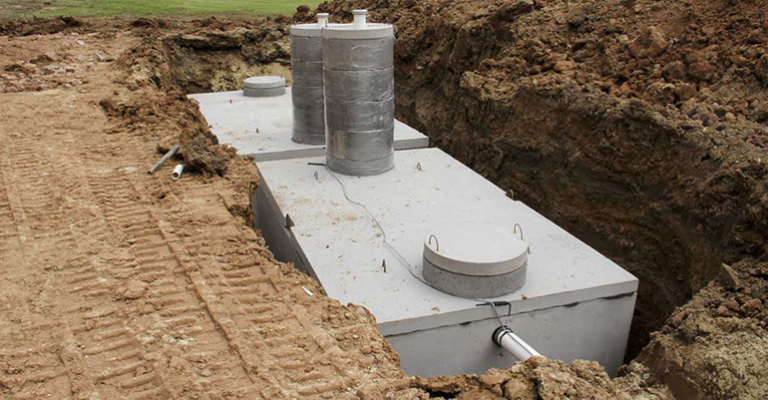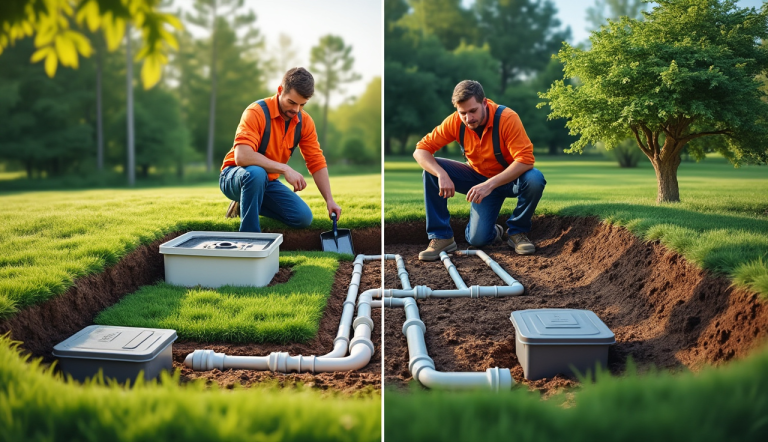Choosing the Right Septic System for Your Property: 5 Essential Tips for Success
When it comes to handling waste, choosing the right septic system for your property is key. A good septic system keeps your property clean and safe. You must think about your land, how many people live there, and your budget. This guide will help you understand what to look for when choosing a septic system.
Selecting the ideal septic system for your property is a crucial decision that impacts both functionality and long-term value. Whether you’re building a new home or upgrading an outdated system, understanding the options available and their suitability for your specific needs is key.
This guide will walk you through five essential tips to ensure a successful septic system installation, tailored to your property’s unique requirements. From assessing soil conditions to understanding local regulations, we’ve got you covered.
Table of Contents
Key Takeaways
- Understand your land. The type of soil and land shape affects your system choice.
- Know your needs. Consider the number of people using the system and their waste habits.
- Choose the right type. Different systems work better for different needs.
- Maintenance matters. Some systems need more upkeep than others.
- Consult a pro. Always get advice from a local expert. For expert help with your septic system needs, consider our septic system inspections.
Understanding Choosing the Right Septic System for Your Property

Before deciding on a septic system, look at your property. The soil type and size of your land matter a lot. In Middletown, New York, the soil can vary. Clay, sand, and loam all affect how well a septic system works.
Your septic system is more than just an essential component of your property—it’s a cornerstone of a healthy, functional home or business. The right septic system ensures efficient wastewater management, safeguards the environment, and aligns with local regulations.
However, choosing the best option can feel overwhelming with so many factors to consider, from soil type and property size to long-term maintenance requirements.
Soil Types and Their Importance
| Soil Type | Characteristics | Impact on Septic Systems |
|---|---|---|
| Clay | Holds water | Slows waste breakdown; may require special systems |
| Sand | Drains well | Often works better; handles more waste without clogging |
| Loam | Mix of clay and sand | Generally suitable for most septic systems |
The type of soil on your property plays a critical role in Choosing the Right Septic System for Your Property and meeting your needs. Soil acts as a natural filter, breaking down contaminants and treating wastewater before it reenters the environment.
Sandy soil, for instance, drains quickly but may not provide enough filtration, while clay soil drains slowly, potentially causing system backups. Loamy soil, often considered ideal, strikes a balance between drainage and filtration.
Conducting a percolation test, or “perc test,” is essential to evaluate your soil’s suitability and ensure your septic system functions efficiently and safely. Understanding your soil type is the first step in making an informed decision. Understanding what type of soil you have helps you make a better choice.
Knowing Your Needs
Next, think about how many people live in your home, as this is a key factor in Choosing the Right Septic System for Your Property. More people mean more waste, which directly impacts the size and capacity of the septic system you need.
A larger household generates more wastewater, requiring a system designed to handle the increased load without sacrificing efficiency. Factors like daily water usage, the number of bathrooms, and even appliances such as dishwashers and washing machines all play a critical role in determining the appropriate septic tank size and system type.
For example, a family of four will have different needs than a couple or a single occupant. Ensuring your septic system matches your household size is key to avoiding overflows and maintaining long-term reliability.
Estimating Water Usage
Understanding your household’s water usage is essential when selecting the right septic system. Water usage varies based on factors such as the number of residents, daily habits, and the efficiency of your appliances.
On average, each person uses about 50-100 gallons of water daily, including showers, laundry, dishwashing, and other activities. A higher water usage rate may require a larger tank or advanced treatment options to prevent strain on the system.
Monitoring your water consumption and planning for potential future increases, like hosting guests or adding family members, ensures your septic system remains efficient and problem-free.
Types of Septic Systems

Septic systems come in various designs, each tailored to specific property conditions and wastewater needs. Choosing the Right Septic System for Your Property is essential to ensure efficiency and longevity. Here are the most common types:
Conventional Septic System
This is the most common type. It has a tank and a drain field. Wastewater goes into the tank first. Here, solids sink to the bottom. The clear water then flows to the drain field. This system works well if you have enough space.
Chamber System
The chamber system is good for sandy soils. It uses plastic chambers instead of traditional pipes. This lets more water flow through. It’s also better for the environment.
Aerobic Treatment Unit (ATU)
This system adds oxygen to the waste. It helps break down waste faster. An ATU is great for small spaces but needs more maintenance. It is often used in areas with strict health rules.
Mound Systems
If you have a high water table, a mound system may be best. It raises the drain field above the ground. This keeps the area dry. Mound systems can fit in places where other systems can’t.
Drip Distribution Systems
These systems use tubing to slowly release water into the soil. This is good for smaller lots. It needs special soil conditions to work well.
Factors to Consider When Choosing a System
Selecting the right septic system requires careful consideration of several factors to ensure long-term functionality and compliance. Choosing the Right Septic System for Your Property is crucial to avoid costly repairs and environmental issues. Here are the key aspects to keep in mind:
Local Regulations
Always check with local health departments. They have rules about septic systems. Some types may not be allowed in certain areas. Knowing the laws will help you choose the right system.
Cost
Cost is often a big factor. Basic systems may cost less upfront, but you need to think about maintenance costs too. More complex systems like ATUs might cost more but can save you money over time.
Installation Space
Do you have enough space for the system you want? Conventional systems need a lot of space. Others, like drip systems, can fit in tighter areas. Measure your land before making a choice.
Environmental Impact
Think about how your system will affect the environment. Look for systems that treat waste well and protect local water sources. Systems that use less water can also help save money.
Maintenance Needs
Once you pick a system, you need to keep it running well. Some systems need more care than others.
Regular Pumping
Most septic tanks need to be pumped every 3 to 5 years. This keeps solids from building up and clogging your system. Make a plan for regular septic pumping.
Inspections
Getting your system checked every few years is smart. A pro can find problems before they become big issues. Catching small problems early can save you money.
Signs of Trouble
Watch for signs that your system might be failing. Some signs include:
- Bad smells near the tank or drain field
- Slow drains in your home
- Water pooling in your yard
Additional Maintenance Tips
- Avoid flushing non-biodegradable items: This can lead to clogging.
- Limit water usage during heavy rains: Reduces system overload.
- Keep trees and shrubs away: Roots can invade the system.
The Role of Local Experts
When it comes to septic systems, partnering with a local expert is invaluable. Professionals familiar with your area understand the unique soil conditions, local regulations, and environmental factors that influence system performance.
Choosing the Right Septic System for Your Property is made easier with their guidance. They can help you navigate the permitting process, conduct necessary soil and site evaluations, and recommend the best system for your property.
Additionally, local experts often have established relationships with suppliers and contractors, ensuring a smoother installation process. Hiring a qualified professional not only saves time and money but also provides peace of mind that your septic system is designed and installed for optimal performance.
Importance of Local Knowledge
Local experts understand Middletown’s needs well. They know what systems work best with the local soil and water conditions, ensuring that you choose the right option for your property.
Choosing the Right Septic System for Your Property becomes much easier with their in-depth knowledge. Plus, they can provide valuable tips for keeping your system healthy and functioning efficiently over time.
Summary
Choosing the right septic system is important for your home. You need to understand your land, know your needs, and pick the right type. Think about costs, maintenance, and local rules to ensure long-term efficiency. Choosing the Right Septic System for Your Property requires careful consideration of these factors to avoid future complications.
Talk to a local expert to help you make the best choice. This will ensure your system works well for years. If you need assistance with your septic system maintenance, consider our trusted septic tank filter inspections.
Final Thoughts
Picking the right septic system is a big job. Take your time to research and plan. A good system protects your home and the environment, ensuring that wastewater is properly treated and managed. Choosing the Right Septic System for Your Property also helps keep your yard and home clean, avoiding costly repairs and potential health risks in the future.
If you have questions or need help, don’t hesitate to reach out to United Sewer & Septic. We are here to help you find the perfect solution for your property. Call us for more information or to schedule a consultation.



